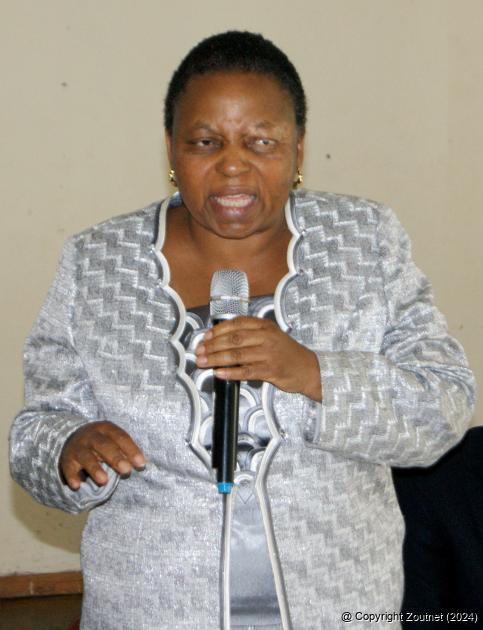

ADVERTISEMENT:

Limpopo Legislature member Ms Merrium Ramadwa explains the Bill for the Protection, Promotion, Development and Management of Indigenous Knowledge to the attendees.
Public hearing on the indigenous knowledge bill
The portfolio committee on sports, arts and culture (PCSAC) held a public hearing on the promotion, protection, development and management of the Indigenous Knowledge Bill at the Makhado Show Grounds last Friday (8 June).
Various stakeholders from the communities were invited – they included, among others, the traditional authorities, traditional health practitioners, municipalities, agriculture and environment sector, arts and culture sector, academic institutions and NGOs.
According to the chairperson of the PCSAC, Ms Shaida Shaikh, the Indigenous Knowledge Bill provides for ways in which indigenous knowledge can be protected. The bill encourages that indigenous knowledge must be registered and sets up a structure called the National Indigenous Knowledge Systems Office in the Department of Science and Technology, which will assist communities to register as indigenous knowledge holders.
“This bill is important because it will prevent the misuse of indigenous knowledge and will ensure that if anyone wants to use this knowledge for commercial gain, they must first get permission from the community who holds this knowledge, and the community should also benefit from this use,” she said. “This bill wants to protect indigenous knowledge in the same way as intellectual property rights.”
She stated that the bill recognised three types of indigenous knowledge, which are knowledge of a functional nature, knowledge of natural resources and indigenous cultural expressions. “Furthermore, if an indigenous community wants to protect indigenous knowledge, it must have been passed from generation to generation, developed within the indigenous community and be associated with that indigenous community.”
The stakeholders who attended the hearing welcomed the bill and requested the PCSAC to speed up the approval process, so that the indigenous knowledge will finally be protected and promoted rightfully.
One of the prominent traditional health practitioners, Maine Vho-Mbilivhili Neluvhola, said there were some people who took sacred possessions of vhunanga to the pastors, who then set them alight, saying they were tools of witchcraft.
“What do we do with those who burn sacred thangu and other stuff that we know are part of indigenous knowledge?” he asked. “The very same people come back running to us for help when they can no longer stand the wrath of the gods and ancestors.”
However, Limpopo Legislature member, Ms Merriam Ramadwa said that if the bill was passed, those stealing indigenous knowledge systems might be arrested and prosecuted for criminal acts.
Another traditional health practitioner informed the PCSAC that the traditional health practitioners were often victims of harassment by police who threatened them with arrest when they were found digging for medicinal herbs in the bushes.
News - Date: 18 June 2018

Recent Articles
-

Arrestasie ná boere dreig om te skiet
26 April 2024 By Andries van Zyl -

Bloodshed continues in ongoing gang war
26 April 2024 By Victor Mukwevho -

'Pervert case' back in court
25 April 2024 By Victor Mukwevho -

Wetteloosheid op paaie wys die krake in plaaslike wetstoepassing
25 April 2024 By Andries van Zyl
Search for a story:

ADVERTISEMENT


Tshifhiwa Mukwevho
Tshifhiwa Given Mukwevho was born in 1984 in Madombidzha village, not far from Louis Trichardt in the Limpopo Province. After submitting articles for roughly a year for Limpopo Mirror's youth supplement, Makoya, he started writing for the main newspaper. He is a prolific writer who published his first book, titled A Traumatic Revenge in 2011. It focusses on life on the street and how to survive amidst poverty. His second book titled The Violent Gestures of Life was published in 2014.
Email: [email protected]

ADVERTISEMENT:

